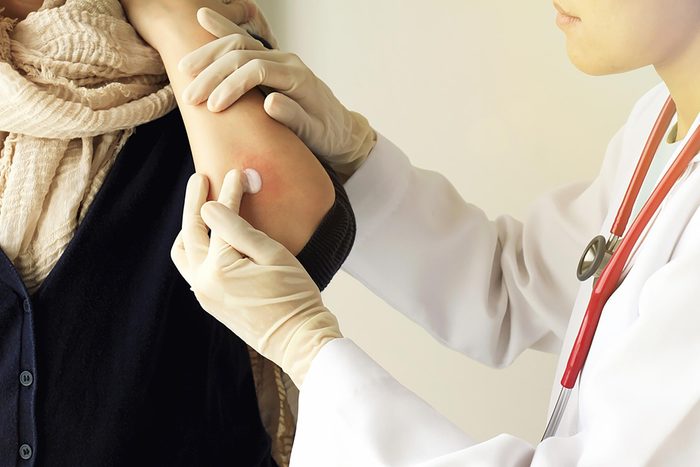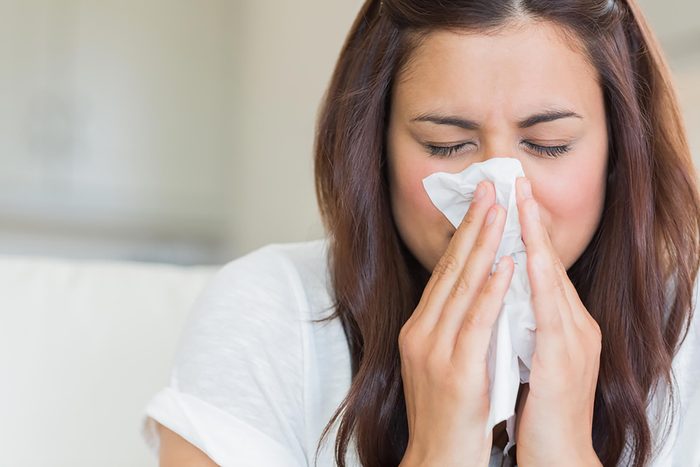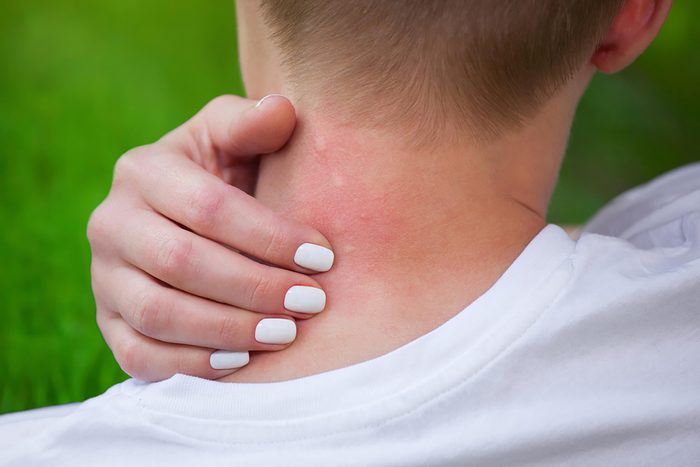Is it allergies?
Allergies cause symptoms that are also common in other health conditions such as sneezing, coughing, and hives, among others. Although there are plenty of things you can be allergic to, you might be mistaking one of the following medical conditions for allergies.

Common cold
It’s the age-old question: Is it a cold or allergies? “Medical conditions that people mistake for allergies are often viral in origin,” explains Nesochi Okeke-Igbokwe, MD. “For example, the rhinovirus, which is one of the top viral pathogens responsible for the common cold, has essentially the same symptoms as allergies.” Both conditions can cause watery eyes, a runny nose, and sneezing. Robert Korn, MD, VP of Emergency Medicine for GoHealth Urgent Care, admits that an allergy diagnosis can take a bit of detective work. “If you suspect you are having allergies, a trial of an OTC non-sedating antihistamine like Zyrtec or Allegra is a good idea,” he says. “It takes two to three days to work, so don’t give up too soon! You may want to add an over-the-counter nasal steroid like Flonase if nasal discharge and itching are prominent.”

Chronic hives
According to the American College of Allergy, Asthma, and Immunology (ACAAI), some people mistake chronic hives for allergies. This is understandable as some allergic reactions cause hives, which are characterized by itchy patches of skin that turn into swollen red welts. Hives may be triggered by pet dander, foods such as eggs, nuts and shellfish, certain medication or pollen, and tend to go away as the allergic symptoms are treated. However, chronic hives last for more than six weeks and may last months or years. Chronic hives are not caused by an allergy, the ACAAI reports. If the cause cannot be identified even after a detailed history and testing, the condition is called chronic idiopathic urticaria. About half of these cases are associated with some immune findings. Chronic hives may also be associated with thyroid disease, other hormonal problems, or in very rare instances, cancer.

Eczema
Atopic dermatitis, commonly referred to as eczema, is a chronic, inflammatory skin condition, and although sufferers may develop asthma and sensitivities or allergies to foods and airborne allergens, eczema itself is not an allergy. However, the skin appears very dry and inflamed, resulting in a similar appearance to allergic contact dermatitis, which is a skin allergy that occurs when a person has exposure to a particular material they are sensitive to. Board-certified dermatologist Arash Akhavan, MD, FAAD, owner, and founder of The Dermatology & Laser Group, sees many patients who mistake perioral dermatitis for allergy. “This is a condition where red bumps occur around the mouth,” he explains. “It is most common in young women, and although the exact etiology is unknown, some believe it may be hormone-related.”

Heat rash
Because of how it looks and feels, a heat rash (also known as prickly heat) is often mistaken for an allergy. “Heat rash commonly occurs in hot, humid climates when someone becomes overheated (possibly from overdressing) and notices red dots or tiny pimples which are itchy, and if scratched, can become infected,” says Jennie Ann Freiman, MD. “It’s usually gone in a few days with no treatment, although a cold bath or shower is very soothing.” To help keep prickly heat at bay, avoid strenuous exercise when it is very warm, use air conditioning and fans in hot weather, take cool showers and baths, dry your skin thoroughly after bathing, wear lightweight, loose-fitting clothes, and drink plenty of fluids to cool the body and to keep hydrated. (Here’s how to identify 14 of the most common skin irritations.)

Sleep apnea
If you regularly wake up with a dry throat and tired feeling, you might wonder if you have an allergy when the culprit could be sleep apnea. “A telltale symptom is snoring,” says Joseph Krainin, MD, sleep expert, founder of Singular Sleep, and chief medical advisor for SoClean. “Although it may seem like just an annoying habit, it actually could be a serious health issue. Obstructive sleep apnea (OSA) is a sleep disorder often characterized by snoring and/or choking during sleep, which is caused by pauses in breath during sleep. It is not age-specific, nor does it affect only overweight people.” According to Dr. Krainin, there are many symptoms of sleep apnea besides snoring. These include feeling unrefreshed after a full night’s sleep, frequent awakenings during the night, excessive daytime sleepiness or fatigue, being overweight, restless sleep, waking up with headaches, and nighttime acid reflux. “It’s important to diagnose sleep apnea and treat it appropriately,” he says. “Not only does sleep apnea affect quality of life, it can cause or worsen many medical problems, including high blood pressure, type 2 diabetes, coronary artery disease, irregular heart rhythms like atrial fibrillation, stroke, and depression.”

PUPPP rash
A medical condition that may occur during pregnancy can be mistaken for an allergy. Pruritic urticarial papules and plaques of pregnancy (PUPPP) typically appears in the third trimester, or postpartum. PUPPP is the most common specific skin condition during pregnancy and tends to begin as tiny, itchy red bumps on the abdomen, surrounding (but never affecting) the navel. Gradually the bumps get bigger, forming large patches that spread down the legs and up the chest. In some cases, the itchy rash can cover most of the body. “Because the rash can appear suddenly and with traditional markers of an allergic rash such as red, itchy skin, some women believe it’s due to something they ate or a lotion,” explains board-certified OB/GYN Fares Diarbakerli, MD.

Nasal symptoms
Some medication, such as beta-blockers, heart medications such as angiotensin-converting enzyme inhibitors, and birth control pills, may cause nasal symptoms that act like an allergy. Sneezing, a runny nose, and congestion can be caused by pain relief medication. “If you notice a link between starting or taking a prescription medication and nasal symptoms, contact your doctor,” says Janna M. Tuck, MD, an ACAAI spokesperson. “If it seems to be related to an over-the-counter medication, stop taking it and check with your pharmacist for a substitute. “As an allergist, I see these mimic conditions all the time because it is quite difficult to tell them apart from truly allergic conditions,” Dr. Tuck says.

Food intolerance
People often confuse a food intolerance with a food allergy, but there’s a big difference. A food intolerance may often mimic a food allergy by causing nausea and vomiting, but it is not life threatening. A good example is gluten, according to the ACAAI. Many people think they have a gluten allergy and avoid gluten. While there is technically no such thing as “gluten allergy,” people who test negative for both celiac disease and a wheat allergy may have a sensitivity or intolerance, the group reports. They might experience symptoms such as diarrhea, constipation, abdominal pain, or fatigue. The symptoms often go away when gluten is taken out of the diet. An intolerance is not an immune response, and the symptoms generally relate to stomach issues. While an intolerance to a food may make you miserable, a true food allergy can be potentially life-threatening.

Insect bites
Insect bites can sometimes mimic hives, a skin allergy that can occur in response to ingested allergens, so it’s easy for people to misdiagnose themselves. Like hives, insect bites may appear as raised, itchy bumps, either red or skin-colored. “People with bed bug infestations in their homes, which has become an all too common occurrence these days, can present with hive-like lesions all over their bodies,” says Dr. Akhavan. Unfortunately, no allergy treatment will get rid of bed bugs! “If you have what you think are allergy symptoms, see a board-certified allergist, who will take a good history, do a physical exam and perhaps do some allergy tests to help you determine if you have an allergy or an allergy doppelgänger,” says Tuck. “The good news is that while you might not have an allergy, your allergist may still be able to help you relieve your bothersome symptoms!”